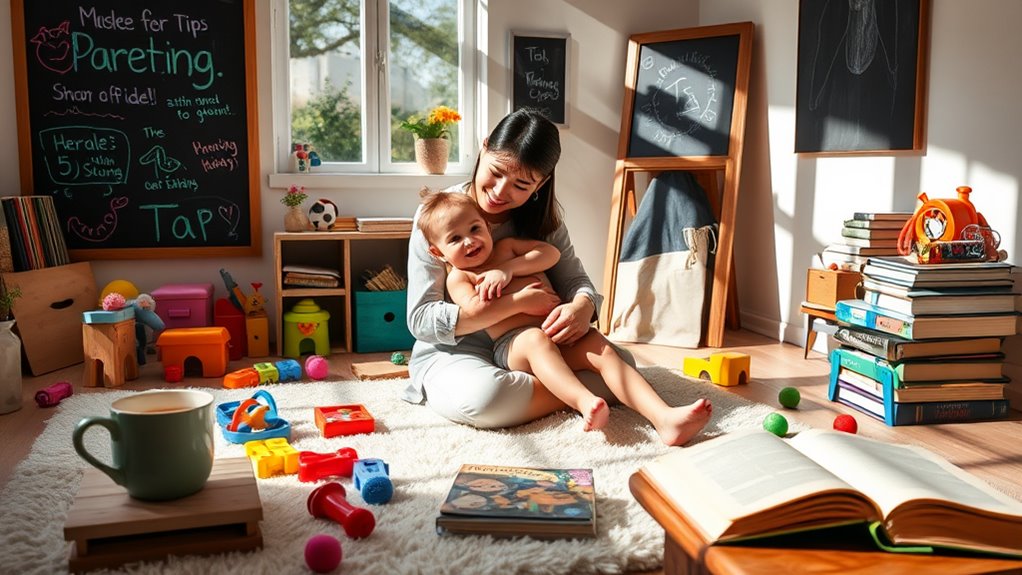The Importance of Active Listening in Parenting
You might underestimate how essential active listening is in your parenting journey. By truly engaging with your child, you’re not just hearing their words; you’re validating their feelings and building trust. This practice can markedly enhance your communication, allowing them to express themselves more openly. But what are the specific techniques that can help you master this skill? And how can it transform your relationship with your child in ways you might not expect?
Understanding Active Listening
Active listening is more than just hearing words; it’s about fully engaging with your child to understand their feelings and thoughts. When you’re having a chat, it’s not just about nodding along or saying, “Uh-huh.” It means you’re paying attention, making eye contact, and showing that you care.
Imagine your child is sharing a story about a tough day at school. Instead of daydreaming about dinner, tune in! Ask questions, like, “What happened next?” or “How did that make you feel?” This shows you’re truly interested.
Taking the time to listen actively can help your child feel valued and understood. They’ll appreciate that you’re genuinely curious about their world. Plus, it builds trust and connection, which is super important.
You might even find some laughs along the way, especially when they share something funny.
Benefits of Active Listening
Listening to your child in a meaningful way can transform your relationship. When you practice active listening, you show your child that their feelings and thoughts matter. This creates a safe space where they can express themselves openly. Imagine how great it feels for them to know you’re really paying attention!
One of the biggest benefits is improved communication. When you listen carefully, your child learns to share their ideas more clearly, too. This can lead to fewer misunderstandings. Plus, active listening helps you pick up on subtle cues—like when they’re feeling sad or excited—allowing you to respond appropriately.
You’ll also notice stronger emotional connections. When your child feels heard, they’re more likely to trust you with their feelings. It’s like building a bridge that connects your hearts.
And let’s be honest, who doesn’t want to feel like a superhero in their child’s eyes?
Lastly, active listening encourages your child’s independence. By letting them voice their thoughts, you’re helping them develop critical thinking skills.
Building Trust With Children
Trust is the foundation of any strong parent-child relationship. When you listen actively to your child, you’re not just hearing their words; you’re showing them they matter. Imagine your child sharing a secret, and you respond with genuine interest. That simple act builds trust. They’ll feel safe opening up to you about their thoughts and feelings.
Being consistent and reliable also strengthens this trust. If you promise to attend their soccer game, make sure you do! Kids notice when you keep your word, and they learn they can count on you.
Plus, don’t forget to respect their feelings. If they’re upset, let them know it’s okay to feel that way. You could say, “I understand why you’re sad,” which helps them feel understood.
Sometimes, trust takes time, so be patient. It’s like growing a plant; you need to water it and give it sunlight. You wouldn’t expect it to bloom overnight!
Enhancing Parent-Child Communication
Effective communication between you and your child can make all the difference in your relationship. When you talk and listen to each other, it helps build a strong connection. So, let’s explore how you can enhance that communication!
First, ask open-ended questions. Instead of yes or no questions, try asking, “What was the best part of your day?” This encourages your child to share more and feel valued.
Remember, it’s not just about talking; listening is just as important. When your child speaks, give them your full attention. Put down your phone, make eye contact, and show you care.
Also, don’t be afraid to share your own feelings. Letting your child know how you feel helps them understand that it’s okay to express themselves, too. You can say something like, “I felt really proud when you finished your project.”
Lastly, keep the conversation light sometimes! Share funny stories or silly jokes; laughter can break the ice and make talking easier.
Recognizing Non-Verbal Cues
Paying attention to your child’s non-verbal cues is just as important as engaging in conversation. Kids often communicate feelings and thoughts through body language, facial expressions, and even silence. When you notice your child crossing their arms or avoiding eye contact, it might be a sign they’re upset or uncomfortable. Instead of just asking, “What’s wrong?” try to read those signals.
If they’re fidgeting or looking away, they may need a little push to share what’s on their mind. You can kneel down to their level, make gentle eye contact, and say something like, “I see you’re feeling a bit shy. It’s okay to share.” This way, you’re showing them you care and are really listening.
Don’t forget about the power of a smile or a warm hug. Sometimes, a reassuring gesture can say more than words. By tuning into these non-verbal cues, you’re building a stronger bond with your child.
Plus, you’ll become a bit of a detective, figuring out what they need without them saying a word! So, keep your eyes and heart open; it’ll make all the difference in your parenting journey!
Encouraging Emotional Expression
Encouraging emotional expression in your child is crucial for their development and well-being. When kids are free to share their feelings, they learn to understand and manage their emotions better.
You can create a safe space for your child by asking open-ended questions like, “How did that make you feel?” or “What do you think about that?” These questions invite them to express themselves without fear of judgment.
It’s important to listen actively, too. Show them you’re really interested by making eye contact and nodding as they talk. This tells them their feelings matter! You might even share a funny story about a time you felt the same way—this helps them see that everyone experiences emotions.
Sometimes, kids might struggle to find the right words. If that happens, encourage them to draw or use toys to express what they’re feeling. It can be a great way to help them open up.
Reducing Conflict and Misunderstandings
Often, conflicts and misunderstandings arise in parenting due to a lack of clear communication. You might think you understand your child, but they could be feeling completely different! When you really listen to what they’re saying, it helps both of you connect better. Instead of jumping to conclusions, take a moment to hear their thoughts and feelings. This way, you’ll avoid those “I thought you meant…” moments that can lead to frustration.
Try to ask open-ended questions. Instead of saying, “Did you have a good day?”, ask, “What was the best part of your day?” This encourages your child to share more and helps you understand their perspective. It’s like opening a treasure chest of information!
Pay attention to their body language, too. Sometimes, a child’s expression says more than their words. If they seem upset, get curious about what’s bothering them.
Strengthening Family Bonds
Active listening not only reduces conflicts but also plays a significant role in strengthening family bonds. When you truly listen to your kids, you’re showing them that their thoughts and feelings matter. It’s like giving them a warm hug with your ears! This connection helps your family feel closer and more united.
Imagine sitting around the dinner table, and instead of scrolling through your phone, you’re engaged in a lively conversation. When you ask questions and show interest, your kids feel valued. They’re more likely to share their worries and joys with you, creating a safe space for open communication.
Plus, listening actively helps you understand their perspectives better, allowing you to support them in ways that really count. You’ll also notice that as you listen, your kids start to listen to you more, too. It’s like a listening game where everyone wins!
Fostering Independence and Confidence
Listening closely to your child’s thoughts can greatly foster their independence and confidence. When you truly hear what they’re saying, it shows them you value their opinions. This simple act encourages them to express themselves more freely. Imagine how they’ll feel when they know you’re genuinely interested in what they think!
As your child shares their ideas, whether it’s about a new hobby or a school project, you’re giving them the chance to explore their thoughts. This exploration helps them make decisions on their own, boosting their confidence. When they see that you trust their judgment, they’ll start trusting themselves too.
Plus, let’s be honest, kids love to feel like they’re in charge sometimes. Allowing them to share their views can lead to fun conversations, and who knows? You might even learn something new!
Encouraging your child to take the lead in discussions not only helps them build independence but also strengthens your bond.
Active Listening Techniques
To truly support your child’s independence and confidence, mastering active listening techniques can make a significant difference.
First, give your child your full attention. Put down your phone, turn off the TV, and make eye contact. This shows them you’re really interested in what they’ve to say.
Next, use verbal prompts to encourage them. Simple phrases like, “I see,” or “Go on,” can keep the conversation flowing. Remember to nod and smile; these little gestures show you care and understand.
You can also reflect back what they say. If your child shares a concern, try saying, “It sounds like you’re feeling upset about that.” This not only validates their feelings but also clarifies their thoughts.
Don’t forget to ask open-ended questions. Instead of just “Did you have fun?” try, “What was the best part of your day?” This invites them to share more and helps you understand their world better.
Finally, be patient. Sometimes, kids need a moment to gather their thoughts. So, take a breath, wait, and enjoy the conversation—after all, these moments are priceless!
Overcoming Listening Barriers
Barriers can often obstruct effective communication between you and your child, making it challenging to truly hear what they’re saying.
First, consider distractions like phones or the TV. If you’re staring at a screen while your child’s talking, you might miss important details. Try putting your devices away; it’s amazing what you can hear when you focus!
Next, think about your own feelings. If you’re stressed or upset, you mightn’t be in the right headspace to listen. Take a deep breath and remind yourself that this moment with your child matters.
Another barrier is assumptions. You might think you know what your child is going to say, but that can lead to misunderstandings. Stay curious! Ask questions, and let them express their thoughts fully.
Lastly, practice patience. Sometimes kids need a bit of time to find the right words. If you rush them, they might shut down.
Practicing Active Listening Daily
Engage with your child by making active listening a daily habit. It’s not just about hearing words; it’s about understanding feelings and thoughts. When your child talks, put down your phone, turn off the TV, and really focus. You might even lean in a bit, showing you care. It’s like being a detective, trying to uncover the mystery behind their words!
Ask open-ended questions, like, “What was the best part of your day?” This encourages them to share more. Don’t rush them; let them express themselves fully. When they know you’re genuinely interested, they’re more likely to open up. And if you find yourself drifting off, gently remind yourself to stay present.
Also, remember to reflect back what they say. You can say, “So you’re feeling frustrated because of that homework?” This shows you’re listening and helps them feel understood.
Finally, make it fun! You could even create a “listening game.” The more you practice, the better you’ll get at it.
Active listening isn’t just a skill; it’s a way to connect with your child and build a strong relationship. So, let’s tune in and enjoy the conversation!




